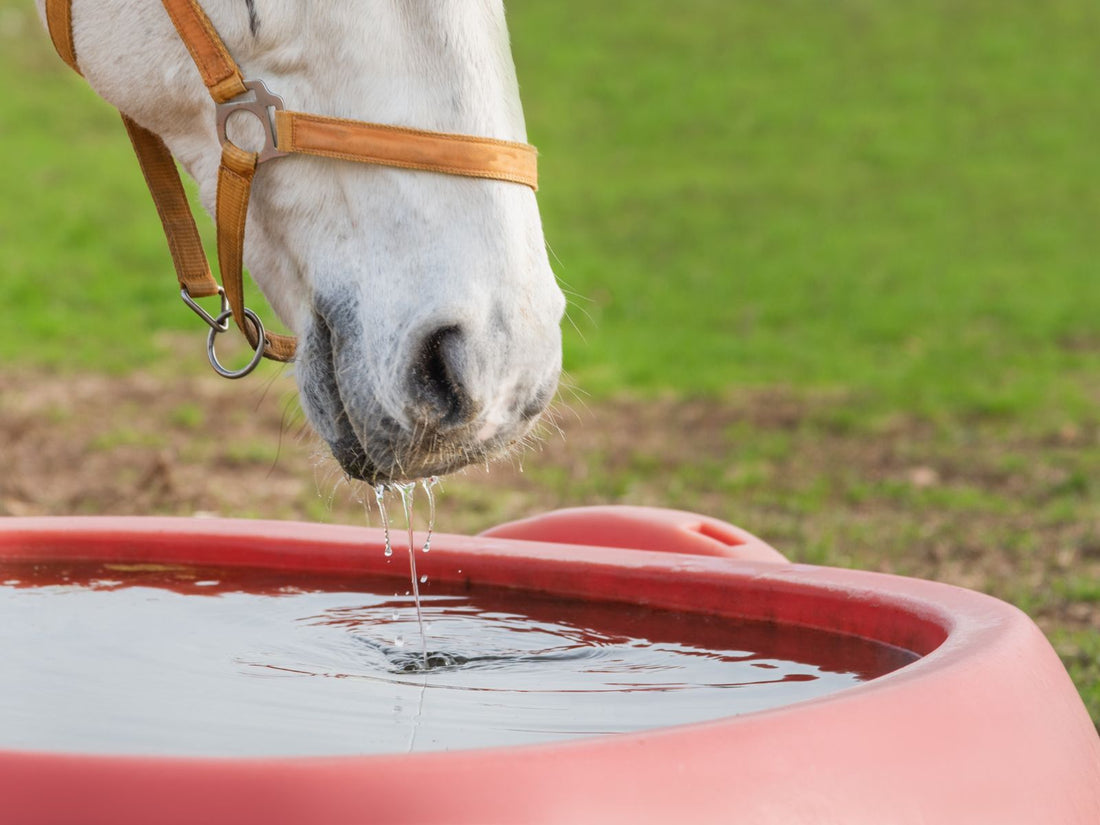
Horse Hydration 101: How Much Water Should Your Horse Drink in a Day
Michelle DrumUnderstanding the significance of proper hydration is fundamental to responsible horse ownership. From its impact on digestion to its role in regulating body temperature, water is a cornerstone of your horse’s health. In this guide, we’ll provide practical knowledge on recognizing signs of dehydration, implementing effective hydration strategies, and addressing potential challenges that may hinder water intake. Our goal is to equip you with the information needed to ensure the health and happiness of your equine partner so you can enjoy years of rides together.
Importance of horse hydration
Keeping horses hydrated is crucial for their overall health and well-being. Like other living beings, horses rely on water to keep bodily functions performing normally. Here are some of the main reasons why hydration is so important for horses.
Digestive health
Horses have a unique digestive system that requires a constant flow of water to maintain proper digestion. Insufficient water intake can lead to colic, a painful condition affecting the digestive tract.
Temperature regulation
Just like us, horses sweat to cool themselves down, especially during physical activity or hot weather. Hydration is essential for efficient thermoregulation, helping prevent heat stress and related issues.
Learn more: Anhidrosis in Horses: What To Do If Your Horse Is Not Sweating
Electrolyte balance
Sweating during exercise results in the loss of electrolytes. Replenishing these electrolytes through water intake is essential to maintain the horse’s proper bodily functions, including nerve and muscle function.
Nutrient absorption
Water is essential for the absorption of nutrients from the horse’s diet. Without adequate hydration, the horse may not efficiently extract the necessary nutrients from its feed, possibly leading to malnutrition and illness.
Joint health
Adequate water intake contributes to joint lubrication, helping to prevent stiffness and lameness. Horses that are well-hydrated are less prone to joint-related issues.
Energy levels
Dehydration can lead to fatigue and reduced energy levels in horses. Proper hydration is vital for maintaining the horse’s stamina and overall performance, particularly for those engaged in regular training.
Preventing general dehydration
Dehydration in horses can lead to various health problems, including kidney issues. It is important to monitor water consumption to ensure horses are adequately hydrated.
How much water does a horse drink in a day?
The amount of water a horse drinks daily can vary based on factors such as size, activity level, diet, environmental conditions, and individual needs. A horse’s weight and body size play a role in determining its daily water needs. Larger horses generally require more water than smaller ones.
On average, a horse can drink 5 to 10 gallons of water daily. Hot and humid weather can increase a horse’s water needs due to the need for additional cooling through sweating. In colder weather, horses may drink less but still require adequate hydration.
How long can a horse go without drinking water?
Horses should not go more than a few hours without access to water. Like most animals, horses need a consistent and adequate water supply to maintain good health. The exact duration a horse can function without drinking water depends on various factors, including how active the horse is, what the climate is like, their diet, and overall conformation. As a general rule, horses should always have access to fresh water, especially in hot and humid conditions.
Signs of dehydration in horses
Recognizing the signs of dehydration in horses is crucial for maintaining their health and addressing any issues promptly. Here are common signs that may indicate dehydration in horses:
- Sunken eyes: Dehydrated horses often have sunken or dull-looking eyes. Normal hydration contributes to bright and alert eyes.
- Tacky gums and mucous membranes: In a well-hydrated horse, the gums and mucous membranes inside the mouth are moist. Dehydrated horses may have dry and tacky gums.
- Reduced capillary refill time: Capillary refill time is the time it takes for the color to return to the gums after pressing on them. To check capillary refill time, press gently on your horse’s gums and count the time it takes for the blood to return. Normal capillary refill time is 1 to 2 seconds. Capillary refill times over 3 seconds could be an indicator of dehydration. Alternatively, pale gums in general can also indicate dehydration.
- Prolonged skin tenting: Skin tenting is a test where the skin is pinched and released. Gently pinch a small fold of skin on the horse’s neck up into a “tent” shape. When you release the skin, it should snap back to the muscle, flush against the body, in about 1.5 seconds. If the skin stands tented away from the body for longer than 1.5 seconds, your horse could be dehydrated and may need veterinary attention.
- Decreased appetite: Dehydration can lead to a loss of appetite in horses. A decrease in feed consumption may indicate an underlying issue, including dehydration.
- Dark urine: Concentrated or dark-colored urine can be an indicator of dehydration. In well-hydrated horses, urine is typically light in color.
- Lethargy: Dehydrated horses may appear lethargic or exhibit a lack of energy. Reduced water intake can impact overall vitality and performance.
- Dry coat and flaky skin: Insufficient water intake may result in a dry coat and flaky skin. Hydration is essential for maintaining healthy skin and coat condition.
- Increased heart rate: Dehydration can lead to an elevated heart rate as the body tries to compensate for the reduced fluid volume.
You may also like: 11 Common Horse Skin Conditions and How to Treat Them
8 ways to keep horses hydrated
As the old adage goes, you can lead a horse to water, but you can’t make them drink. Here are eight ways you can help keep your horse hydrated and healthy.
1. Provide access to clean water
Always ensure that horses have access to clean and fresh water at all times, in winter or summer. If you notice your horse is not drinking water, examine the water source for any problems, such as contamination, temperature extremes, or unfamiliar smells that might deter the horse from drinking.
Be sure to regularly clean water troughs and buckets to prevent contamination. Food, dust, hair, and other debris can quickly cause water to spoil and promote algae growth. Algae can cause illness in horses if consumed in large quantities.
2. Monitor water intake
Pay attention to the amount of water your horse typically consumes. Changes in water intake can be an early sign of health issues or dehydration. Be sure to pivot your approach to your horse’s hydration with the strategies provided below if you notice your horse is drinking less water.
3. Adjust diet appropriately
Consider the type of feed your horse receives. Diets with higher moisture content, such as wet feeds or feeds soaked in water, can help keep horses hydrated, while drier feed has the opposite effect. If a horse has difficulty chewing or has dental issues, consider incorporating soaked feeds, such as soaked hay or hay cubes, into their diet to increase water intake.
4. Salt & electrolyte supplements
Providing access to a salt block or similar supplement can encourage horses to drink more water as salt stimulates thirst, helping to maintain hydration. Consider offering electrolyte supplements, especially during periods of increased physical activity, hot weather, or if the horse has been sweating excessively. Electrolytes help replace minerals lost through sweating.
5. Regular exercise
Adequate exercise is essential for maintaining overall health. However, ensure that horses have access to water during and after exercise to replenish fluids lost through sweating.
6. Monitor environmental conditions
Hot and humid weather can increase a horse’s water requirements. During such conditions, ensure that horses have ample shade and access to water to prevent dehydration. Hydration is also important in the winter months. Make sure your horse’s water source is always fresh and not frozen.
7. Routine veterinary check-ups
Sometimes it can be hard to tell whether a horse is adequately hydrated. Schedule regular veterinary check-ups to monitor your horse’s health. Veterinarians can provide guidance on hydration and detect any underlying health issues.
8. Temperature management
Provide ways to cool horses during hot weather, such as misting fans or shaded areas. This can reduce the risk of heat stress and encourage water intake.
How to keep your horse hydrated on the road
When traveling long distances with horses, it’s tempting to drive straight to your destination with few stops. However, that’s not always in the best interest of your horse. If you’re not able to provide water in the trailer during the haul, you should stop every 2-4 hours and offer your horse water. A good rule of thumb for long hauls is to offer water every time you stop for gas or at the nearest rest area. Gas stations and truck stops generally have water spigots available for customer use, though you may need to ask for a key before getting access.
Some horses can also be picky about drinking water at new locations. For example, if they receive well water at their home stable, they might refuse municipal water while at a show or on the road. Members of our team are known to use alfalfa cubes to motivate their horses to drink on the road; the horse “bobs” for the floating alfalfa cubes and ends up drinking water at the same time. Some equestrians even bring large quantities of water from home if they know their horses are particularly picky.
What to do if your horse is not drinking water
If your horse continues to refuse water or shows signs of dehydration, it’s crucial to consult with a veterinarian. A veterinarian can conduct a thorough examination to identify any underlying health issues and recommend appropriate treatment.
In severe cases, a veterinarian may use a nasogastric tube to administer fluids directly into the horse’s stomach. This is a measure taken when the horse is at risk of dehydration and insufficient oral intake.
Remember that dehydration in horses can escalate quickly, so prompt action is essential. If you have concerns about your horse’s water intake, seeking professional advice from a veterinarian is crucial for proper diagnosis and treatment. Dehydration is a serious condition that requires timely intervention to ensure the well-being of your horse.
Hydration is key for a healthy, happy horse. Knowing how to spot dehydration and how to encourage your horse to drink water are key to being a responsible horse owner. By implementing these practices, you can help maintain optimal hydration levels in your horse and reduce the risk of dehydration-related health issues. Regular observation, proactive measures, and consultation with a veterinarian when needed are key components of effective hydration management.
You might also like:

1 comment
Very informative and clear information. Thank you